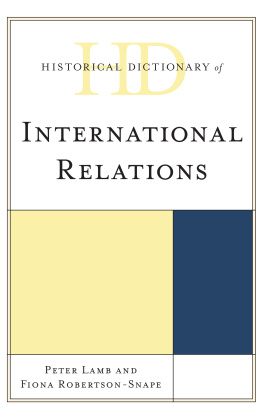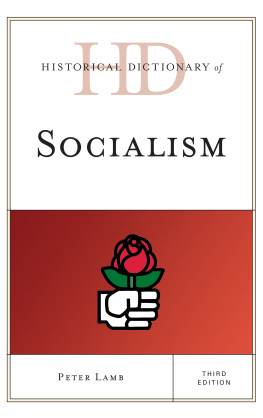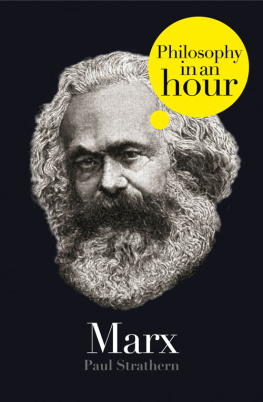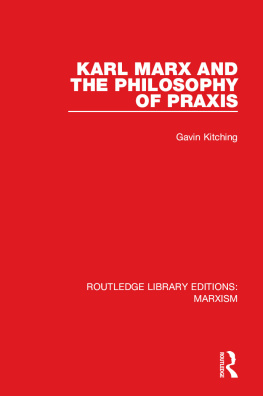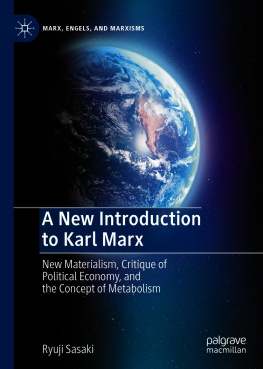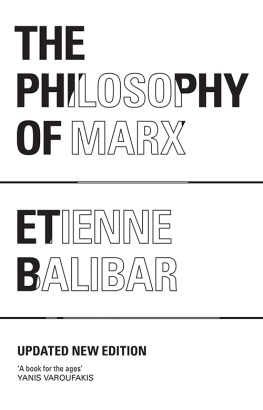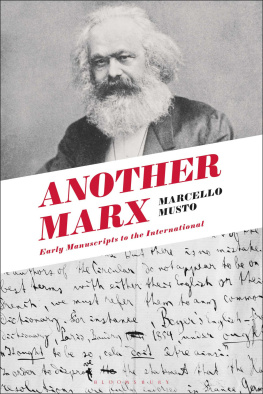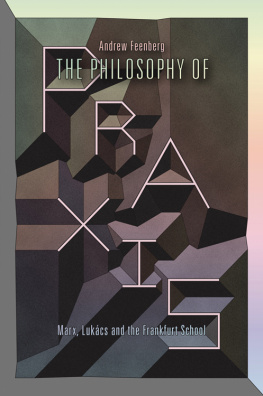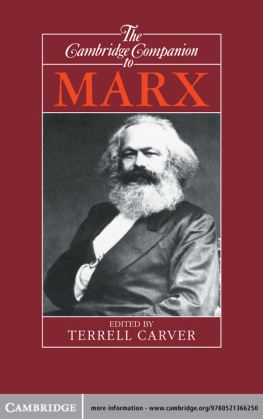The First Marx
To Catherine, Eleanor and Val
ALSO AVAILABLE FROM BLOOMSBURY
Bloomsbury Companion to Marx, edited by Jeff Diamanti, Andrew Pendakis and Imre Szeman
Aesthetic Marx, edited by Johan Hartle and Samir Gandesha
Contemporary Marxist Theory, edited by Andrew Pendakis, Jeff Diamanti, Nicholas Brown, Josh Robinson, Imre Szeman
How to Be a Marxist in Philosophy, Louis Althusser
Marxs Grundrisse: a Readers Guide, Simon Choat
Marx and Engels Communist Manifesto: a Readers Guide, Peter Lamb
Marxs Concept of Man, Erich Fromm

CONTENTS
Karl Marx was born on 5 May 1818. We finished the manuscript for this book two months before the day of his bicentennial anniversary. The first Marx with whom we are concerned in the book actually began to emerge in the 1830s when his voracious reading led him to discover Kant, Hegel and the thinkers who became known as the Young Hegelians. He soon became very critical, although to different degrees, of all these philosophers along with many others of his own times and before. By the late 1840s, Marx had begun to undergo the process of metamorphosis by which he gradually became quite a different thinker albeit one who never entirely abandoned many of his earlier ideas, even though he voiced some of them in quite different terms.
We are not concerned in what follows with the later Marx, tempting as it is in some places to compare and contrast him with the first Marx. Instead we have identified ways in which the first Marxs many various writings, along with some of those of Engels with whom he had had already by 1844 begun to work closely, can together be reconstructed to form a coherent, radical social and political philosophy. Marx at times indicated that he intended to do something like this. Once, however, he had abandoned the manuscript of The German Ideology to the mice, philosophy had taken a back seat as he was concerned primarily with actually changing the world. We hope our reconstruction makes a worthwhile contribution to the early project which he never finished.
Douglas Burnham and Peter Lamb
March 2018
We would like to thank everybody at Bloomsbury, especially Frankie Mace and Liza Thompson, for being so understanding about the unfortunate and unavoidable delay in submitting our manuscript. We are also very grateful to the staff of the National Health Service for making the completion of this book possible.
Thanks go to Staffordshire University for allowing us the time to work on the book and to our colleagues at the University who have been very helpful in many ways. We also acknowledge the invitation we accepted to present our ideas on the first Marx in the Royal Institute of Philosophy lecture series at Keele University. We received some very helpful questions and other feedback from the audience at our lecture.
Finally, it almost goes without saying that we thank Val, Catherine, Eleanor, others in our families, our colleagues and our friends for all their help over the course of a very difficult period.
For secondary sources, we use the (author, date: page[s]) method in the text, with a list of references at the end of the book. The references also include Marx and Engels Collected Works, 50 volumes. To help readers trace items referenced from the Collected Works, these items are inserted in brackets in the text in the following style: (EPM, CW3: p[pp] .). Please see .
Table 1 Items in Marx and Engels Collected Works (CW)
| Reference in Text | Author and Title |
| C1, CW35 | Marx, Capital, Volume One |
| CAAZ, CW1 | Marx, Communism and the Augsburg Allgemeine Zeitung |
| CCHPL, CW3 | Marx, Contribution to the Critique of Hegels Philosophy of Law |
| CCHPLI, CW3 | Marx, Contribution to the Critique of Hegels Philosophy of Law. Introduction |
| CE, CW3 | Engels, The Condition of England |
| CJM, CW3 | Marx, Comments on James Mill, lmens dconomie politique |
| CMN, CW3 | Marx, Critical Marginal Notes on the Article The King of Prussia and Social Reform by a Prussian |
| CPE, CW29 | Marx, A Contribution to the Critique of Political Economy |
| CQG, CW6 | Engels, The Constitutional Question in Germany |
| CWCE, CW4 | Engels, Condition of the Working Class in England |
| DAKG, CW6 | Marx, Declaration Against Karl Grn |
| DD, CW1 | Marx, Doctoral Dissertation: Difference Between the Democritean and Epicurean Philosophy of Nature |
| DLTW, CW1 | Marx, Debates on the Law on Thefts of Wood |
| EPM, CW3 | Marx, Economic and Philosophic Manuscripts of 1844 |
| FNL, CW6 | Engels, The Festival of Nations in London |
| GI, CW5 | Marx and Engels, The German Ideology |
| HF, CW4 | Marx and Engels, The Holy Family, or Critique of Critical Criticism |
| JCFM, CW1 | Marx, Justification of the Correspondent from the Mosel |
| LA28/12/1846, CW38 | Marx, Letter to Annenkov 28/12/1846 |
| LA179, CW1 | Marx, Leading Article 179 in the Klnische Zeitung |
| LB, CW49 | Engels, Letter to Bloch, 2122/9/1890 |
| LDFJ, CW3 | Marx, Letters from Deutsch-Franzsische Jahrbcher |
| LF 3/10/1843, CW3 | Marx, Letter to Feuerbach, 3/10/1843 |
| LF 11/8/1844, CW3 | Marx, Letter to Feuerbach, 11/8/1844 |
| LM 19/11/1844, CW38 | Engels, Letter to Marx, 19/11/1844 |
| LM 28/9/1892, CW49 | Engels, Letter to Mehring, 28/9/1892 |
| LMFT, CW1 | Marx, Letter from Marx to His Father in Trier |
| LR 13/3/1843, CW1 | Marx, Letter to Arnold Ruge, 13/3/1843 |
| MCP, CW6 | Marx and Engels, Manifesto of the Communist Party |
| OCPE, CW3 | Engels, Outlines of a Critique of Political Economy |
| OJQ, CW3 | Marx, On the Jewish Question |
| PP, CW6 | Marx, The Poverty of Philosophy |
| Pr, CW1 | Editors, Preface |
| RBBA-C, CW5 | Marx and Engels, A Reply to Bruno Bauers Anti-Critique |
| RYM, CW1 | Marx, Reflections of a Young Man on the Choice of a Profession |
| SFEA, CW3 | Marx, Summary of Frederick Engels Article Outlines of a Critique of Political Economy Published in DeutschFronzsiche Jahbcher |
| SR, CW2 | Engels, Schelling and Revelation |
| TF, CW5 | Marx, Theses on Feuerbach |
In the early to mid-1840s, Karl Marx produced a wide and varied range of writings which, when considered together, comprise a coherent and cogent political philosophy. Beginning with the doctoral dissertation (DD, CW1) he submitted in the spring of 1841, and spanning the next five years until he and Friedrich Engels wrote The German Ideology (GI, CW5) in 1845 and 1846, the building blocks of this philosophy emerged in an untidy assortment of books, journalistic pieces, letters, drafts and various other documents. The majority of these items were never published in Marxs lifetime and the fragments of the philosophy embedded in this assortment have yet to be satisfactorily pieced together.


